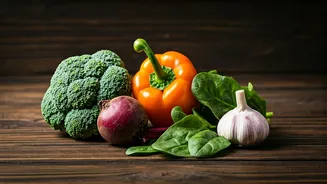Understanding Fatty Liver
Fatty liver disease, a prevalent condition, stems from an excessive accumulation of fat within the liver cells. This can arise from various factors, including
obesity, excessive alcohol consumption, and unhealthy dietary patterns. Initially, fatty liver may not manifest noticeable symptoms. However, if left unaddressed, it can advance to more severe forms, like cirrhosis and liver failure. This necessitates a proactive approach to managing the condition. Key strategies involve lifestyle modifications, such as incorporating a balanced diet and engaging in regular exercise. Furthermore, understanding the role of specific foods can be crucial in supporting liver health and mitigating the adverse impacts of fatty liver.
The Power of Greens
Certain vegetables possess properties that can aid in managing fatty liver disease. These vegetables often contain antioxidants, vitamins, and other beneficial compounds. They contribute to liver detoxification, reduce inflammation, and potentially reverse the accumulation of fat. It is crucial to integrate these vegetables into your regular diet. The inclusion of diverse vegetables ensures a broad spectrum of nutrients, supporting the overall health of the liver. Moreover, the dietary modifications should be complemented by other healthy habits, such as maintaining a healthy weight, limiting alcohol consumption, and consulting with a healthcare professional for personalized guidance. This integrated approach will help improve liver health.
Leafy Green Champions
Leafy greens such as spinach and kale are packed with antioxidants like glutathione, which helps with liver detoxification. They are also rich in fiber, which aids in the elimination of waste and supports digestive health. Including these greens in your diet on a regular basis can have a substantial positive impact on your liver health. You could incorporate them into salads, smoothies, or even cook them as side dishes. Their versatility makes it easy to add them to your diet. Ensure the leafy greens are washed carefully to remove any pesticide residues, and also alternate the greens to get a wider range of nutrients. This will help you maximize the benefits derived from them.
Cruciferous Vegetable Benefits
Cruciferous vegetables, like broccoli and Brussels sprouts, contain compounds that promote liver detoxification. These vegetables are loaded with glucosinolates, which help activate liver detoxification enzymes. They also assist in reducing inflammation and protecting liver cells from damage. Regularly consuming these cruciferous vegetables can support the overall health of your liver. They can be steamed, roasted, or even eaten raw in salads. It is crucial to ensure that they are cooked adequately. For those who find the taste challenging, consider incorporating them into your meals gradually. This helps you to adapt to the taste and also gain their advantages.
Garlic and its Allies
Garlic is known for its potent antioxidant and anti-inflammatory effects. It contains allicin, a compound that helps reduce fat accumulation in the liver and support liver detoxification. Adding garlic to your cooking can contribute significantly to liver health. Not only does garlic add flavor to your dishes, but it also provides numerous health benefits. It is essential to use garlic in moderation. You can also include garlic in your diet through supplements, but consult with a healthcare provider. Always take into account the potential for interactions with other medications, and be sure to eat your garlic cooked, to lessen any digestive issues.
Beetroot's Detox Power
Beetroot is rich in betaine, a compound that helps protect the liver and reduce inflammation. It also supports the liver's detoxification processes. Beetroot juice is a popular option, but you can also consume beetroot in salads or cooked as a side dish. Beetroot is a nutrient-dense food that promotes liver health. Beets offer a sweet earthy taste, and they can be incorporated into a diverse range of meals. Make sure to select high-quality beetroot for optimal nutritional value. Additionally, make sure to consume beetroot in moderation, especially if you have any existing medical conditions. Seek advice from a healthcare professional about the best practices.















